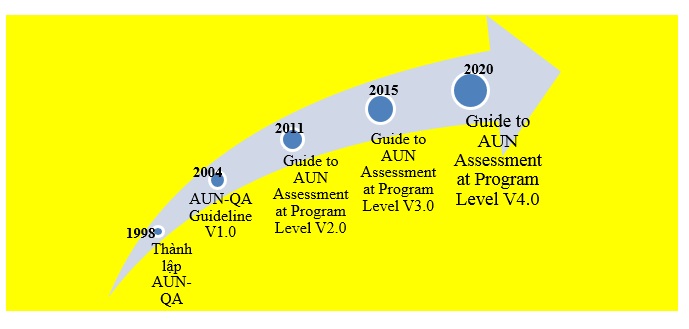
07 training programs of UEH meeting AUN-QA standards
In 2019, UEH had 04 more training programs that meet AUN international standards with a duration of 5 years, valid until June 29, 2024, including: Bachelor of Investment Economics under UEH Faculty of Economics; Bachelor of Banking Program under UEH Faculty of Banking; Bachelor of Finance Program under UEH Faculty of Finance; Bachelor of Public Finance Program under UEH Faculty of Public Finance.
Previously, UEH had 03 training programs including Finance-Banking, Accounting and Management at University level recognized by AUN-QA organization within 2015-2016.
UEH has been consistently maintaining a culture of quality internally and externally in accordance with regional and international practices with the purpose of assuring the interests of learners and employers in the high-quality human resource segment.
Introduction regarding AUN-QA Set of Standards
AUN (ASEAN University Network) is a network of leading Universities in Southeast Asia (SEA), established in November 1995 by the initiative of the Council of Education Ministers of Southeast Asia, with members initially nominated by the Minister of Education of the countries.
Since its establishment, AUN has considered training quality as an important goal in order to affirm the development of higher education in Southeast Asia to the world with the purpose of creating linkages and mutual recognition of training quality among Universities within and outside the AUN network. To achieve this goal, AUN has launched an initiative to assess the quality of higher education of Universities in Southeast Asia in accordance with the AUN-QA common quality assurance standards issued in 2004 (AUN-QA stands for ASEAN University Network - Quality Assurance).
AUN-QA, a set of standards with strict quality rules together with specific and clear criteria, concentrates on evaluating the conditions to ensure the training quality of the entire training program, not just in accordance with the specific characteristics of each specialty.
The AUN set of standards comprehensively evaluates the training program from many aspects listed as output standards, program framework, teaching staff, facilities, quality assurance, connection among Universities and students and businesses and so on.
AUN did recognize the importance of quality and the need to develop a comprehensive QA system among member Universities. Since then, AUN-QA has developed and issued multiple versions of quality assessment standards at both the training program and educational institution levels, in accordance with an empirical approach based on proven quality assurance examples that have been rated, improved and shared. The development of the AUN-QA standards at the curriculum level is depicted in the following illustration figure:
The development process of AUN-QA standards at Training program level

The AUN-QA V4.0 set of standards was compiled in accordance with the review results of the AUN Expert Council combined with the feedbacks from stakeholders after each external audit, including: auditors, managers and involved lecturers. Edition is comprised of 8 standards and 53 criteria: Standards include as follows:
- Standard 1: Output standard, 5 criteria.
- Standard 2: Program structure and content, 7 criteria.
- Standard 3: Teaching and learning methods, 6 criteria.
- Standard 4: Evaluation towards learners, 7 criteria.
- Standard 5: Teaching staff, 8 criteria.
- Standard 6: Student-support services, 6 criteria.
- Standard 7: Facilities, 9 criteria.
- Standard 8: Output graduation, 5 criteria.
Each criterion is evaluated on 7 levels as follows:
- Level 1: Nothing (no supporting documents, plans, records)
- Level 2: Newly-developed plan
- Level 3: Documented: without substantiated or acceptable but unclear
- Level 4: Having clear documents and supporting documents
- Level 5: There is a strong track record of effectiveness in the area under review
- Level 6: Good quality
- Level 7: Excellent
Each criterion in the set of standards has the same weigh; the evaluation score of the entire program is the average score of all 74 criteria. 4.0 is the threshold score for AUN quality accreditation standards.
The selection of accreditation in accordance with the AUN-QA standards is to help one University to be acknowledged of which level the training program has reached on the regional evaluation scale; after that, to detect which problem has been existing during program implementation, what needs to be overcome to ensure that the program is of the same quality as other programs in the same field in the ASEAN region.
